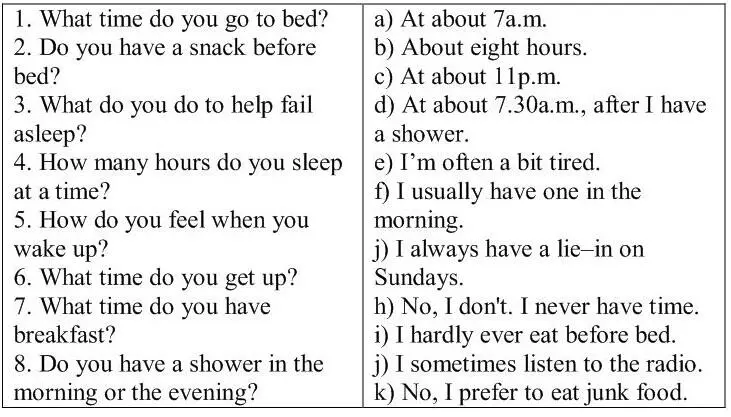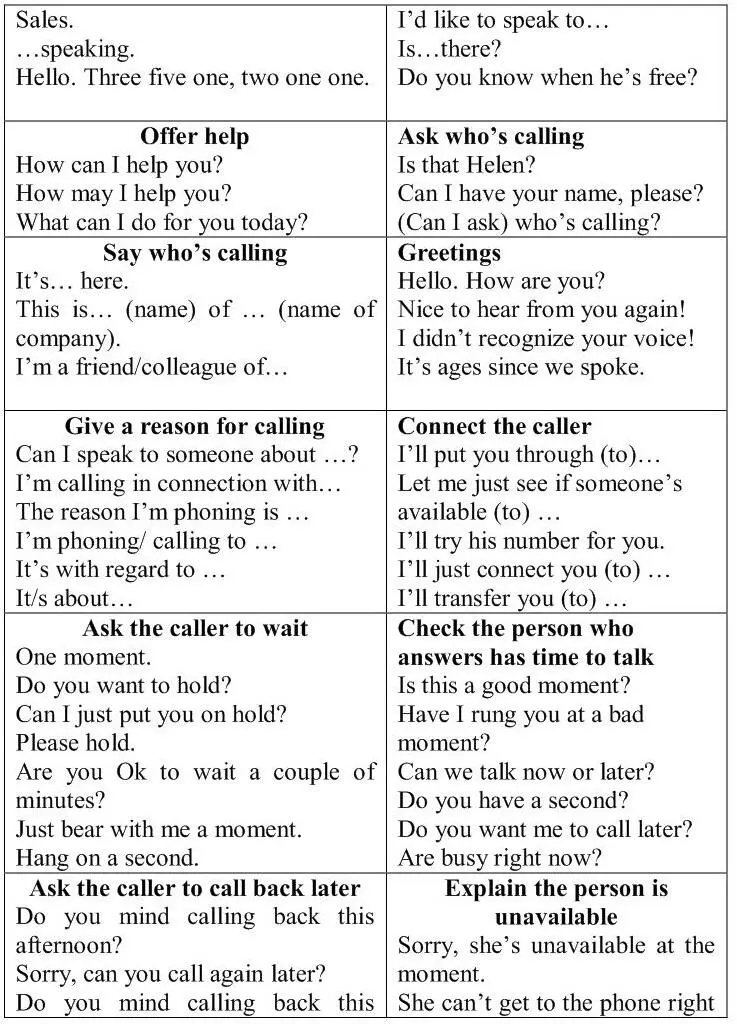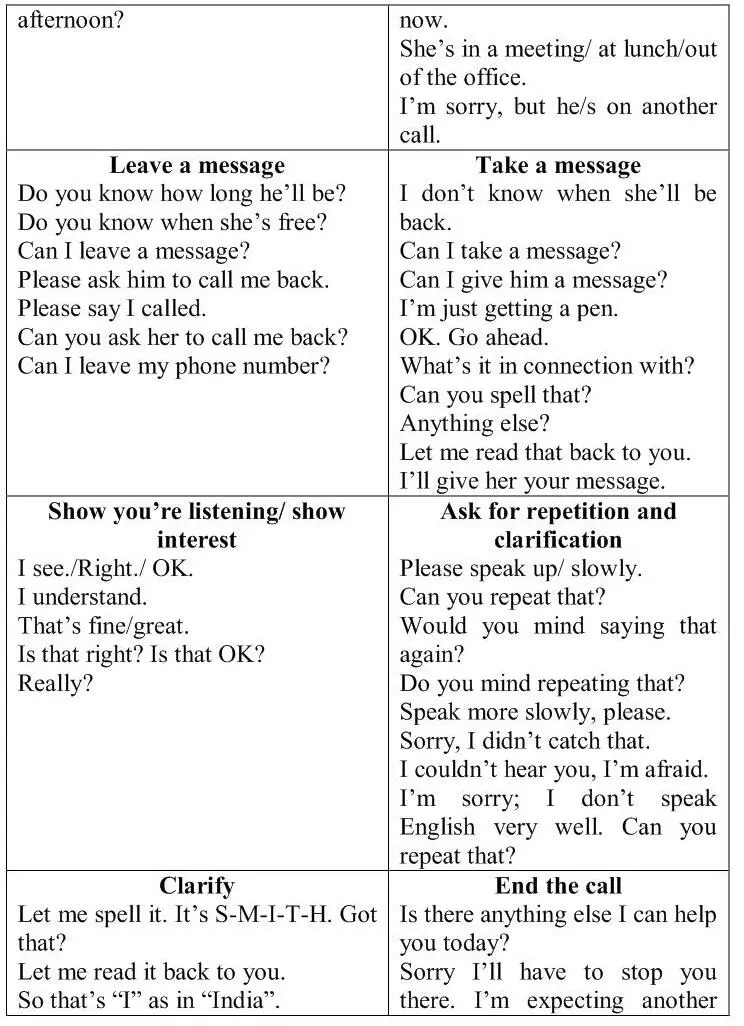Елена Волкова - Steps in Speaking English (Шаги в разговорном английском)
- Название:Steps in Speaking English (Шаги в разговорном английском)
- Автор:
- Жанр:
- Издательство:Литагент БИБКОМ
- Год:2013
- Город:Казань
- ISBN:978-5-7882-1472-6
- Рейтинг:
- Избранное:Добавить в избранное
-
Отзывы:
-
Ваша оценка:
Елена Волкова - Steps in Speaking English (Шаги в разговорном английском) краткое содержание
Steps in Speaking English (Шаги в разговорном английском) - читать онлайн бесплатно ознакомительный отрывок
Интервал:
Закладка:


Exercise 4. Read the text.
Is sleeping a problem for you? Do you want to sleep but can't fall asleep? Here are some tips for happy sleeping:
1. Have a snack of bread or fruit about an hour before you go to bed.
2. Try not to have a nap in the day. Only sleep at night.
3. If you wake up at night, don't get up. Just stay in bed and read a book.
4. Always have breakfast in the morning, it's the most important meal of the day.
Exercise 5. Make dialogs, using the information above. Imagine that you are:
a) a doctor, and a patient came to you with his sleep problem asking for help
b) a mother, and you want your child to sleep well, explain him why sleep is so important
c) a student of medical university, and you give tips to your friend who has a sleep problem
Exercise 6. Answer these questions:
1. Which advice in Ex.5 do you follow?
2. Which tips do you agree with?
3. Which tips do you disagree with?
4. Which tips can you add to the list?
5. Have you got your own formula of a sound sleep 11 11 sound sleep – крепкий сон (мед.)
?
Exercise 7 . Read the text paying attention to the underlined words.
We asked these people about their typical Saturday. Here's what they said:
I don't like getting up early at the weekends so I usually stay in bed late – sometimes until about 10.30 a.m.! I absolutely love having a big breakfast on Saturdays. I can't stand going to the gym or doing exercise but I sometimes go for a walk in the afternoon. I quite like meeting friends in the park or just lying on the grass and doing nothing. I'm not very keen on going out on Saturday evening. I stay in and chat on the phone and get a take-away pizza.
Maria Stroinova, Moscow, RussiaI really hate doing nothing so I get up early on Saturdays and start the day by checking my emails. I really like meeting friends and having breakfast in a cafe, so I catch a bus into town at about 9.00 a.m. After breakfast, my friends and I sometimes go to an art gallery in Hermitage. I'm quite keen on most kinds of art so I don't mind which gallery we go to but my friends really hate modern art that's why we often visit Hermitage but we don't lift on the top floor, where expressionists are exhibited. I do different things on Saturday evenings. I sometimes have dinner with friends or I stay in and watch TV.
Konstantin Belov, Saint Petersburg, RussiaExercise 8. Complete the sentences with Maria or Konstantin.
Example: Konstantin likes getting up early on Saturdays.
1 ______ likes having a lot to eat for breakfast.
2 ______ doesn't usually have breakfast at home on Saturdays.
3 ______ doesn't like doing any sport or exercise.
4 ______ likes doing nothing in the park.
5 ______ likes going to art galleries.
6 ______ likes chatting on the phone on Saturday evenings.
7 ______ likes watching TV in the evening.
Vocabulary. Preferences.

Exercise 9. Ask other students about their Saturdays.
1. What do they absolutely love doing?
2. What do they really hate doing?
3. Tell about your Saturdays using the words above and words from the vocabulary.
Exercise 10. Make short dialogs using the scheme:


Example.
A: I think you really hate listening to heavy metal.
B: No, you’re wrong. I absolutely love it, especially Rammstein early in the morning.
Exercise 10. How often..?



Exercise 11. Read these expressions, translate them, try to learn them by heart and complete your own dialogs using the same pattern.




Exercise 12. Please, play your role, using the expressions above.
Students B Role plays.
1 Making and taking calls
You are the receptionist at AIC computing. Answer the phone and ask for the caller’s name. Connect the caller to Louis.
Now you are Louis. Answer the phone. Say you don’t have time to talk. Ask the caller to call later.
2 Reasons for calling
You saw a job advert in the paper for the position of trainee manager. You’d like to apply for the job. Call the Human Resources Department and ask them to send you details. Give your name and address.
3 Leaving messages
Answer the phone. Rashid is out of the office today. You don’t know when he’ll be back. Take a message for him. Take the caller’s mobile number.
4 Taking messages
Answer the phone. Martha is out. Take a messages for her.
5 Asking the caller to wait
You work in Henri Reiser’s office. Answer the phone. Henri is talking on another line. Find out if the caller wants to wait.
6 Asking for repetition and clarifying
Your colleague calls about a visit by a client next week. Write down the information about the client’s arrival at the airport.
7 Ending the call
Answer the phone. It’s a colleague. You’re VERY busy today.
8 Booking hotels and restaurants
You are the manager of Renoir’s restaurant. Answer the phone and take a booking. Remember to ask for:
Customer’s name? number of guests? date and time
A contact number? smoking or non-smoking table?
9 Booking transport

10 Dealing with telephone problems
You’re waiting for you colleague’s to arrive. You have a meeting with him/her and you can’t meet later on. Answer your colleague’s call. It’s a really bad line.
11 Making appointments
You are Mr. Francone. Your colleague calls to arrange a meeting. You have a day off on Tuesday 25th. You are free at 3.15 on the next day. Find out where the meeting is.
12 Inviting people
Your friend calls and invites you to the theatre. Find out when it is. Accept or decline.
13 Confirming arrangements
You are organizing your Managing Director’s leaving party. Here is your current schedule. Your boss calls to confirm the arrangements.

14 A conference call
You are a sales manager. The company wants your staff to have English lessons. You have ten staff but they are very busy and some don’t want to stay late. Talk the training manager and try to find a solution.
15 Placing an order
Your work at Spyline. Take a customer’s order and complete the order form below:

16 Solving problems
You work for a delivery company. A regular customer calls with a problem. What action will you take?
17 Complaining and handing complaints
You work in a hotel. A customer calls you with some complains.
18 Selling on the phone 1
Answer a call from a company which design websites. You don’t have a website so you are interested. Arrange for the person to visit.
19 Selling on the phone 2
You work for the “Print Machine”. You have a special offer on printer cartridges at the moment. Take the customer’s details and offer to visit his/her company.
Lesson III. Topics: Relationship, Love, Friendship
Vocabulary. Close people and things.
your best friend, your shoes, your teacher, your watch, your oldest friend, your mobile phone, your doctor, your pet, your relatives
Exercise 1. Choose three things/people from the list above. Tell the students how long you have know the people or had the things.
Vocabulary. Official relationship.
a colleague – someone you work with
an old school friend – someone you were at school with
get in touch – start having contact
go out (with someone) – have a romantic relationship
get on well (with someone) – have a good relationship
lose touch – have no more contact
ask someone out – invite someone to go on a date with you
grow apart – slowly stop having a good relationship
put up with – accept a bad situation without complaining
split up with – stop being someone’s partner
get over – stop feeling sad about an ex–partner
Exercise 2. Answer the questions.
1. Have you ever gone out with your colleague?
2. How often do you get in touch with your old school friends?
3. Do you get on well with your parents?
4. Do you usually lose touch with your ex–boyfriend/girlfriend?
5. Have you ever had a romantic relationship with your old friend?
6. Is it difficult for you to start having contact with new people? Why?
7. With whom have you no more contact? Why? Would you like to get in touch with these people again?
8. Do women ever ask men out in your country?
9. What do you think is the minimum time you should go out with someone before you get married?
10. Do you think couples who marry young often grow apart? Why/Why not?
Читать дальшеИнтервал:
Закладка:






